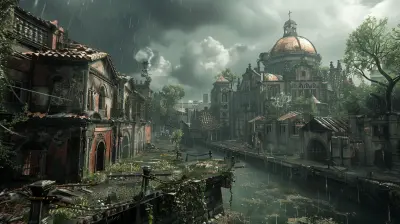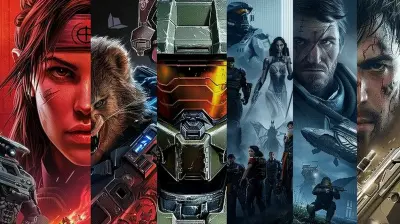How Podcasts Are Bridging the Gap Between Developers and Fans
7 October 2025
Podcasts have taken over the world. From true crime to comedy, there's something out there for everyone. But one niche that's been quietly growing is gaming podcasts—and no, we're not just talking about game reviews or walk-throughs. We're talking about something much deeper: a direct line between developers and fans. Imagine sitting in on a cozy fireside chat with your favorite developer, hearing their thoughts, struggles, and passion firsthand. That’s exactly what these gaming podcasts are delivering.
So, how exactly are podcasts bridging the gap between developers and fans? Why are they becoming such an important tool in the gaming community? Grab your headphones and let’s dive in.
A New Wave of Communication
Let’s be real. Gaming used to be a one-way street. Developers made the games, fans played them, and the only interaction might be a tweet or a forum reply—if you were lucky. But now, podcasts are changing the vibe.Developers Are Grabbing the Mic
Game developers are people too—massive shock, right? They’ve got stories to tell, challenges they've faced, and a whole lot of behind-the-scenes chaos that fans never see. Podcasts give them a platform to share all that in a natural, unfiltered way.From talking about that feature that never made the cut, to explaining why a patch took longer than expected, podcasts let devs control the narrative. And fans? They eat it up. It’s more personal, and more real.
Fans Feel Heard (Even When They’re Not Talking)
Okay, it might sound weird—how can fans feel heard when they’re just listening? But here’s the thing: when developers open up on podcasts and talk in a more casual, honest way, fans feel like they're part of the conversation, even if they’re just nodding along on their morning commute.It breaks down that “us versus them” wall that can sometimes form, especially after a buggy launch or controversial update. Suddenly, it’s not just “why did the devs mess this up?”—it’s “oh wow, I didn’t realize that technical limitation was a thing.”
Humanizing Game Development
Pulling Back the Curtain
Game development isn’t just sitting in front of a computer coding all day (though, let’s be fair, there’s a lot of that too). It’s art, science, business, and a bit of magic all rolled into one. Podcasts offer a sneak peek into that world.Think of it like a backstage pass to your favorite band’s concert. You get to hear about the late-night brainstorming sessions, the failed prototypes, the unexpected bugs that somehow only appear on Tuesdays...
These behind-the-scenes stories add a whole new layer of appreciation for the games we love.
From Studio Names to First Names
One of the coolest things about podcasts? They make the devs more than just a logo or Twitter handle. Suddenly, you know that Sarah from the animation team loves JRPGs or that Mike the lead designer is obsessed with 90s platformers.This familiarity builds trust. Knowing the humans behind the games makes it easier to empathize when things go wrong and to celebrate when things go right.
Strengthening Communities
Games thrive on communities. Whether it's fan art, speedruns, or heated Reddit debates over lore, the community keeps the game alive long after release. Podcasts play a huge role in this.A Shared Conversation
When a new developer podcast episode drops, it's like new lore for the community. Listeners pick apart the details, speculate about future updates, or reflect on the development journey. These shared experiences bring people together.Podcasts also create a shared vocabulary. Once fans and devs are talking about the same thing, in the same way, communication becomes smoother and more productive everywhere—from Discord chats to forum feedback.
Encouraging Feedback Loops
Many developer-hosted podcasts take it a step further by encouraging feedback directly from listeners. Some include Q&As, listener-submitted questions, or even live shows. This puts fans in the loop—not just as consumers, but as collaborators.And let’s not forget about indie devs. For small studios with limited reach, podcasts are a game-changer (pun intended). They allow these developers to connect with their audience personally, building loyalty from the ground up.
The Rise of Developer-Centric Gaming Podcasts
Let’s spotlight a few types of developer-focused podcasts that are gaining traction. These aren’t your standard “Top 10 Games of 2024” lists. These are rich, engaging, and made with love.1. The Dev Diary Style
These are like audio journals. Developers hop on the mic and talk about their personal journey—what inspired them, the challenges they’ve faced, the unexpected turns during development.Podcasts like Dev Game Club or Game Maker's Notebook are great examples. You feel like you're walking through memory lane with the devs themselves.
2. Roundtable Chats
These involve multiple developers, maybe guests from different studios or roles. Think of it as a casual lunchroom conversation—but way more informative (and probably with fewer microwave burrito smells).They offer different perspectives. A writer, a designer, an audio engineer—all discussing how a game came together? Pure gold.
3. Deep Dive Episodes
Instead of general updates, these focus on one specific aspect of a game—like how the enemy AI was programmed or what went into designing a specific boss fight.These episodes are catnip for fans who love the techy or creative side of development.
Why Podcasts Work Better Than Blogs or Social Media
Let’s be honest—blogs and tweets can only go so far.The Power of Voice
There’s something intimate about hearing someone’s voice. You catch their tone, their excitement, their frustration. It’s way more engaging than reading a block of text, especially when devs are telling personal or emotional stories.You can’t always tell someone’s passion through a blog, but on a podcast? You feel it.
Portable and Personal
Podcasts fit into busy lives. Fans can listen while gaming, commuting, cooking, or pretending to work (we won’t tell). That casual accessibility means more people tune in regularly, unlike blogs or YouTube videos that demand your full attention.Plus, when fans listen to the same voices regularly, it builds a strange (but wonderful) one-sided friendship. It’s like having a dev buddy in your earbuds.
How Podcasts Influence Game Development
Wait, can podcasts actually influence the direction of a game? Absolutely.Real-Time Response to Feedback
When fans react to podcast episodes—whether praising a new mechanic or questioning a decision—developers get an immediate sense of community sentiment. It’s not just analytics or survey data; it’s real, emotional feedback.Some devs even use podcasts to test the waters for upcoming changes. Drop a teaser, see how fans feel, and adjust accordingly.
Increasing Transparency Builds Loyalty
Let’s face it: modern gamers are more informed (and demanding) than ever. We want to know everything—roadmaps, patch plans, design choices. Podcasts help devs stay ahead of the curve with transparent communication.And when studios are open and honest, even about setbacks, fans are more forgiving. They see the effort. They stick around.
Tips for Developers Starting Their Own Podcast
Thinking about jumping into the podcasting world? Sweet. Here are a few quick tips to get started:1. Keep It Conversational
Don’t script everything. Aim for a relaxed, natural tone—like you're chatting with friends at a coffee shop. That’s what makes it click with listeners.2. Be Consistent
Whether it’s weekly, bi-weekly, or monthly—stick to a reliable schedule. Your listeners will build it into their routine.3. Mix Up the Format
Solo episodes are great, but throw in interviews, Q&A sessions, or behind-the-scenes retrospectives to keep things fresh.4. Address the Community
Talk about fan theories, highlight cool community projects, or clarify common misconceptions. Show your audience that you’re listening.Final Thoughts: The Game-Dev Podcast Era
In a world where attention spans are shrinking and social media drama is endless, podcasts are refreshingly real. They're long-form, thoughtful, and filled with emotion. More importantly, they’re closing the gap between the people who make games and the people who play them.Whether you're a die-hard fan or a developer looking to share your journey, podcasts offer a middle ground—a cozy, digital campfire where stories and ideas flow freely. So next time you hit “play” on a dev podcast, remember: you're not just listening. You're connecting.
all images in this post were generated using AI tools
Category:
Gaming PodcastsAuthor:

Lana Johnson
Discussion
rate this article
1 comments
Harlow Mercado
What a fantastic article! It's inspiring to see how podcasts create meaningful connections between developers and fans, fostering a sense of community and understanding that enriches the gaming experience for everyone.
October 14, 2025 at 4:32 PM

Lana Johnson
Thank you for your kind words! I'm glad you found the article inspiring and insightful. Podcasts truly do play a vital role in connecting developers and fans.


